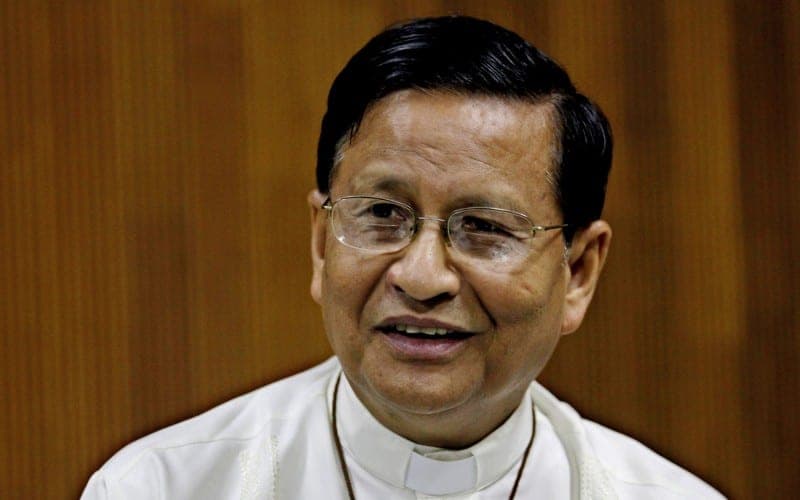Myanmar’s Cardinal Charles Bo opened an Asian conference of religious women by denouncing an “environmental holocaust,” and comparing ISIS to economic and ecological ‘terrorists’ in today’s world.
“We are gathered here today not against ISIS terrorists,” Bo said. “We are gathered here against economic terrorists and ecological terrorists. Both terrorisms are unleashed against the poor, [and] the unborn.”
Quoting Pope Francis’s encyclical on the environment, Laudato Si’, Bo says the pope presents the world’s current crisis as an integral ecological one.
“We are faced not with two separate crises, one environmental and the other social, but rather with one complex crisis which is both social and environmental,” wrote the pope in the section quoted by Bo. “Strategies for a solution demand an integrated approach to combating poverty, restoring dignity to the excluded, at the same time protecting nature.”
Bo’s remarks came as he was delivering the key note speech to a conference of religious women of Asia and Oceania taking place in his diocese, Yangon. They were centered on the theme of the gathering, “Call for a Global Ecological Conversion.”
Crux received his full address via email.
“Can this gathering be set on fire with a ferocious longing for justice?” Bo told the participants in a speech delivered on February 27. “Can we hear the cry of the earth at this very moment groaning with carbon suffocation, can we hear the cry of the 1,800 poor children buried every hour because they have no food? Let our ears be open, let our eyes be open.”
During his address, Bo, created a cardinal by Pope Francis in 2015, also called for a “Green Theology of Liberation” and spared no words against Americans, saying that despite accounting for only six percent of the world’s population, they produce 40 percent of Green-house gases.
[Editor’s note: According to Wikipedia, the U.S. represents 4.4 of the world’s total population, and according to World Resources Institute, by 2010 the country produced 15.6 of the world’s green-house gases.]
“They have blasted the ozone zone, they have created global warming,” he said. “And the world is warm, they switch their air conditioners and sleep. Who’s dying? The poor are dying.”
According to Bo, the world is today faced with an “environmental holocaust.”
“It is a very delicate moment. Pope Francis raised his voice against this impending disaster talking about modern sins, ‘ecological sins’ made individually and collectively by humans who destroy Mother Earth,” Bo said.
Again quoting Francis, the cardinal said that humanity is destroying biological diversity by causing damage to its climate.
“To contaminate the earth’s waters, its land, its air, and its life – these are sins,” Bo said. “Yes this is the age of modern computers, this is the age of modern smartphones, this is the age of modern sins – yes ecological sins. Individually and collectively human beings have chosen to destroy the mother earth. They are polluting the very womb that bore them. Modern day greed has unleashed an ecological terrorism against mother earth.”
Climate change is real, Bo said, and the earth is boiling, with some parts of the world “already roasted,” with many islands of Oceania at risk of disappearing if the world’s temperature increases by another four degrees.
His extensive remarks had an apocalyptic undertone, actually speaking about an ecological apocalypse at one point. Bo also said that unless humanity changes course, in the next century there will be millions of environmental refugees from Australia, the Philippines and Indonesia, and babies will die in their mother’s wombs due to lack of oxygen.
Today’s crisis, Bo said, can be articulated in one sentence: “Might is right,” which he defined as the powerful being owners of everything, amidst a global economy that is made for “looters and cronies.” This economic injustice, he pointed, was attacked by the pope in his first apostolic exhortation, Evangelii Gaudium.
“But there is another injustice,” he continued. “Environmental injustice. Ecological injustice. The rich live a vulgar life of sheer enjoyment, destroying forests, creating green-house gases that increase global warming.”
Myanmar, he said, is always among the last countries in most global rankings. Yet it’s the world’s second most vulnerable nation to global warming, after Bangladesh.
“Cyclones, earthquakes, floods, name it,” Bo said. “Rich countries throw carbon into [the] atmosphere. We suffer and bury thousands after every natural disaster.”
This is ecological terrorism, he insisted: “The powerful of this world are deciding who should live and who should die. Is it for this Christ died on the cross?”
Towards the end of his speech Bo gives several concrete proposals to the participants of the conference, including paying greater attention to the traditions of indigenous peoples, fighting for ecological justice and putting forth an ecological evangelization.
Yet as per his own words, his key recommendation is the creation of a Green Theology of Liberation, an “eco-theology” which integrates “God’s creation as our cause and source of our contemplation.”
Some thirty years ago, Bo said, theologians like Peruvian Gustavo Gutierrez “listened to the cry of the poor and out came the explosion of liberation theology.” The poor, he said, forgotten for so long by “arm chair theologians” were put on center stage, with the “option for the poor” being central in the theological discourse today.
Quoting former Brazilian priest Leonardo Boff, another famed exponent of Liberation Theology, he said that the cry of the poor is often caused by the cry of the earth, so both the Latin American theology and the ecological one he proposes complement each other.

















